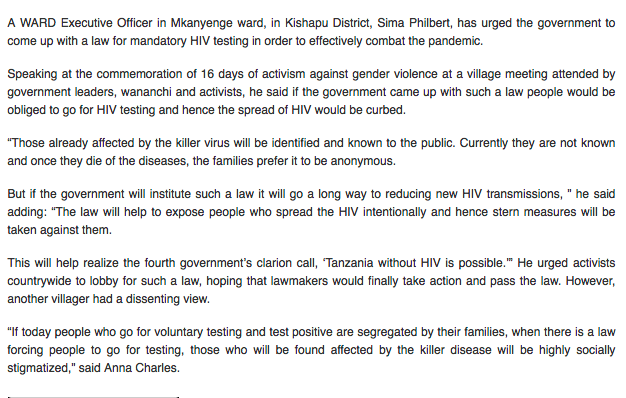The ongoing case of Rosemary Namubiru, the Ugandan nurse accused of exposing a child to HIV during the course of administering an injection, is highlighted in a powerful press release issued yesterday by AIDS Free World. Fortunately, Ms Namubiru is being supported by several advocacy and human rights organisations as well as by individual HIV advocates in Uganda.
The inflammatory media coverage (an example of which is this horribly invasive TV news story, above) not only increased HIV-related stigma and violated Ms Namubiru’s right to a fair trial, but is also being used to help justify the passing of the draft HIV Prevention and AIDS Control Bill 2010 which includes a number of problematic provisions including mandatory HIV tests for pregnant women and their partners, and forced disclosure of HIV status to a newly diagnosed person’s partner by a medical practitioner. In addition, the Bill contains two overly broad and problematic HIV-specific criminal statutes.
In late 2009, a group of more than 50 Ugandan and international organisations and individuals released a report criticising many of the provisions of an earlier draft. That early advocacy resulted in the removal of a criminal penalty for the transmission of HIV from mother to child through breastfeeding.
Advocacy co-ordinated by the Uganda Network on Law, Ethics and HIV/AIDS (UGANET), continues to argue that the unfavourable clauses must be completely removed and that Uganda must assent to the East African Community (EAC) HIV & AIDS Prevention and Management Act which contains provisions meant to supersede Ugandan law.
Read the entire press release below and download the PDF version here.
HIV-Positive Nurse Tried by Media
––Uganda’s first court case dealing with criminalization of HIV transmission could have far-reaching consequences––
February 11, 2014 (Kampala, Uganda)––Rosemary Namubiru, a Ugandan nurse, stands accused of exposing a child to HIV during the course of administering an injection. The incident incited a media firestorm, leading to Namubiru’s arrest and trumped-up charges of attempted murder. That these were baseless charges was confirmed at the opening of the trial today when the charge was changed to criminal negligence; charges that could still carry up to seven years in prison. As the trial begins, it is clear that the damage has already been done. Namubiru was tried and convicted in the public eye by the media, violating her rights and presumption of innocence.
The implications of this case are far-reaching: the Namubiru case appears to be the first in Uganda’s courts dealing directly with HIV exposure and transmission. Efforts to criminalize HIV transmission, and the failure of both the media and the prosecutors office to act responsibly, set a dangerous precedent and could have grave consequences for the fundamental rights of people living with HIV and AIDS in Uganda and beyond.
Case Summary
Rosemary Namubiru, 64, a nurse with 35 years of experience, was working at the Victoria Medical Centre in Kampala, Uganda. On January 7, 2014, Namubiru was attempting to give an injection to an ill 2-year-old patient. Neither she nor the mother could calm the distraught child. With the child writhing and kicking, the needle accidentally pricked Namubiru’s finger; she stopped what she was doing, washed and bandaged her pricked finger, and returned to the child. She was eventually able to administer the injection.
Uncertain about whether the same needle was used throughout, the mother became concerned about the possibility that her child had been exposed to HIV. It was confirmed that Namubiru is HIV-positive and is on anti-retroviral drugs. The child was given an HIV test; the results were negative. A precautionary 2-month post-exposure prophylaxis regimen was initiated, after which the child will be re-tested.
Rosemary Namubiru was arrested in front of a bevy of journalists. She was held by the Criminal Investigations Department for four days before her first appearance in court. She was charged with attempted murder, which carries a sentence of up to life imprisonment, and remanded to Luzira National Prison to await trial. On February 7, 2014, she was denied bail and returned to prison to await trial. Minutes before the trail began on February 11, 2014, the prosecutor announced the charge would be changed to “negligent act likely to spread infection of disease.” With this new charge in place, the prosecutor began to call its witnesses, and the trial is ongoing.
Trial by media
Since the moment of her arrest, Rosemary Namubiru has been found guilty in the court of public opinion. Even though research has shown that the likelihood of HIV transmission from a needle puncture is miniscule––only 0.32% of those exposed to HIV through a subcutaneous puncture became infected––Namubiru has been singled out and vilified in the press because of her HIV-positive status.
Here are just a few of the libelous accusations that appeared in the media reports in the immediate aftermath of her arrest:
* An article with the headline “Killer nurse charged with attempted murder” went on to accuse Namubiru of “maliciously infecting her patients, mainly the children with her HIV positive blood.”
* Another claimed that she “drew her own HIV-infected blood and injected it into a two-year old child.”
* Shortly after Namubiru’s arrest, one article stated that police were “investigating allegations that the woman has been engaging in the act for a pretty long time.”
* An article that appeared in The Africa Report speculated about Namubiru’s mental state, calling her “the fiendish nurse” and claiming “the baby’s incessant cries drove her mad.”
* One journalist opined that “as police struggled to find an appropriate charge to punish such an evil act, it became clearer that our laws are inadequate to cover such emerging but deadly crimes.”
* An editorial about the case declared, “The majority of our doctors and nurses may well be great professionals, but it’s also true that among them are many people who do not harbour good intentions for one reason or another. These could be inherently evil-minded, bitter or mentally unstable.”
False and sensational accounts by irresponsible media can prejudice the outcomes of trials and violate the fundamental human rights of people living with HIV and AIDS. Section 28 of Uganda’s constitution guarantees that every person charged with a criminal offence shall “be presumed to be innocent until proved guilty.”
A miscarriage of justice
Even before the trial began, serious questions surfaced regarding Rosemary Namubiru’s ability to receive a fair hearing. From the spectacle of her arrest—recorded by media who were clearly alerted in advance–-to the baseless original charge of attempted murder, and the rush to trial before the defense could prepare, it is clear that this is a sensationalized case.
Throughout the process, there have been numerous violations of Rosemary Namubiru’s rights:
* According to Section 23(4)(b) of the Ugandan constitution, an accused person can only be held for up to 48 hours before a hearing. Namubiru was held for four days before her first court appearance.
* The prosecution argued against granting bail, stating that Namubiru poses a grave risk to the public, even though there is no evidence of intent to commit any crime.
* Namubiru had no lawyer present when police extracted a statement from her; she was unable to access legal counsel until she had been in detention for a week.
* The Prosecutor claimed on February 7, 2014 that the State had completed its investigation and was ready to proceed to trial. Namubiru’s lawyers had not yet seen the State’s evidence, and were informed that they would receive the file the day before the trial was slated to begin. Section 28 of Uganda’s constitution guarantees that every person charged with a criminal offence shall “be given adequate time and facilities for the preparation of his or her defence.”
What are the broader implications of this case?
HIV advocates fear that the Namubiru case could set a dangerous precedent, in terms of both the criminalization of HIV transmission and the treatment of people living with HIV and AIDS.
Many advocates worry that the case could be used to justify passing the proposed HIV Prevention and AIDS Control Bill 2010. The bill includes two overly-broad sections on the criminalization of HIV, as well as a number of other troubling provisions that would restrict the rights of persons living with HIV and AIDS. If the government moves to legislate the criminalization of HIV, specific groups—including pregnant women, who are easily identified within the chain of transmission—could be targeted for criminal charges. (For more on the proposed bill and its implications, please visit www.uganet.org).
AIDS-Free World unequivocally disagrees with the notion of having a separate criminal code for people who are HIV-positive. If a person attempts to do bodily harm to another, regardless of the means, the existing laws should apply. By creating laws that specifically criminalize HIV transmission, the courts place the emphasis on the person, rather than the crime.
The media frenzy created by this case illustrates the degree to which HIV stigma still exists. Many advocates warn that the introduction of HIV-specific laws would be a dramatic setback in efforts to eliminate discrimination, particularly in the workplace.
Expert global guidance on the criminalization of HIV transmission
In its landmark report, the Global Commission on HIV and the Law recommended that:
“To ensure an effective, sustainable response to HIV that is consistent with human rights obligations:
2.1. Countries must not enact laws that explicitly criminalise HIV…exposure. Where such laws exist, they are counterproductive and must be repealed.
2.2. Law enforcement authorities must not prosecute people in cases of HIV…exposure where no intentional or malicious HIV transmission has been proven to take place.
2.4. Countries may legitimately prosecute HIV transmission that was both actual and intentional, using general criminal law, but such prosecutions should be pursued with care and require a high standard of evidence and proof.
—–
Rosemary Namubiru is being supported by several advocacy and human rights organizations, including the International Community of Women Living with HIV, Eastern Africa (ICWEA), Uganda Network on Law, Ethics and HIV/AIDS (UGANET), The National Forum of People Living with HIV in Uganda and AIDS-Free World (NAFOPHANU), and by individual HIV advocates including Canon Gideon Byamugisha, Milly Katana, Major Rubaramira Ruranga.

